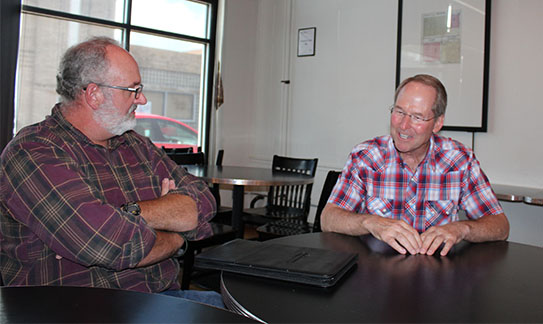By CRISTINA JANNEY
Republican candidate for governor Dr. Jim Barnett stopped in Hays on a statewide ag tour Friday to discuss the importance of agriculture to growing the state economy.
“You have to help to find ways to help the economy grow,” he said. “That has been one of our focuses. … It is obvious to us that the next governor has to understand and promote the value and importance of agriculture. It is a core of our state and the root of our economy. It actually represents the personality of Kansas as well.”
Aaron White, local farmer and director for the Ellis County Coalition for Economic Development, brought several concerns to Barnett about improving the ag economy in Kansas.
White, who also worked for Cargill for a time, said there are issues with logistics in shipping and processing ag commodities in the state.
Some railroad spurs have closed, and the lines that are left have a minimum of 110 cars. This makes it difficult for small elevators to ship their commodities.
White told Barnett he would like to see the governor increase the maximum weight load for shipping by semi-truck during harvest. Colorado, Oklahoma and Nebraska all do this, and some carriers avoid Kansas because they are carrying heavier loads.
“This would help farmers and elevators get their products out faster,” he said.
The current system discourages farmers from diversifying their crops, White said.
Farmers who try to produce nontraditional crops have no local destinations to take their harvests. He gave the example of a state program that offered incentives for white wheat. Producers were offered 22 cents per bushel to produce the crop, but the farmers stopped using the program because the local elevators wouldn’t take it.
White also said he would like to see more opportunities for local commodity processing — whether that be local milling, ethanol production or other products.
Barnett said Kansas ag is crucial to the success of the state economy.
“That is why I am here today,” he said. “I understand how important agriculture and livestock is to Kansas. We can’t afford to lose a $5 billion industry from Kansas because we don’t have water or we don’t have roads …
“We put all our eggs in one basket, which was the zeroing out of taxes, and the rest went to the wayside. As a result, we got behind. We are behind. We are behind border states and the rest of states in economic growth, and we developed a huge budget shortfall.”
Barnett said he supports returning to the three-legged stool approach to taxes, which relies equally on property taxes, sales taxes and income taxes.
He is not supporting increases in taxes. He said stabilizing the state’s budget could take as much as 10 years.
“In my opinion, long-term, the only way to get out of it is through economic growth. I don’t think we can increase taxes enough to solve any of our budget issue long-term. We are going to have to build on the foundation we have now with the legislature,” he said.
One attendee asked Barnett about immigration. Barnett said legal immigration is necessary to farming in Kansas.
“The immigrant workforce, and we want those to be legal immigrants, are crucial to the ag economy,” Barnett said.
He added, “If the next governor of Kansas works in a restrictive way or gets too far into the issue of blaming our economy on illegal immigration, we are going to hurt ourselves.”
Barnett said the federal government’s attempt to pass comprehensive immigration reform had been a “maddening failure.”
Barnett, who has been a physician for 35 years, was asked several questions about health care.
Barnett said hospitals are going to need to stay open if the state is going to keep its communities alive. He said he supported the expansion of Medicaid in Kansas, but the real reform needs to come in reducing the high cost of medical care.
Dawn Berry of Hays said her mother, who is in nursing home care, is paying more on private pay than those who were on Medicaid. Barnett noted when Medicare and Medicaid do not pay for the full cost of care or someone is treated in an emergency room and can’t pay, those with insurance or private pay have to share the cost.
“Medicaid is a program with many, many problems, as our entire health care system is,” Barnett said. “Many people are caught in the intersection of higher and higher and higher health care costs, really out-of-control health care costs, and the intersection of low wages. It is not because they don’t want to work. They are working. Many of them are working two jobs, and they still can’t afford health care.”
Barnett said he favors a system known as value-based purchasing that rewards health care systems for keeping people healthy rather than running expensive tests and keeping hospital beds full.

